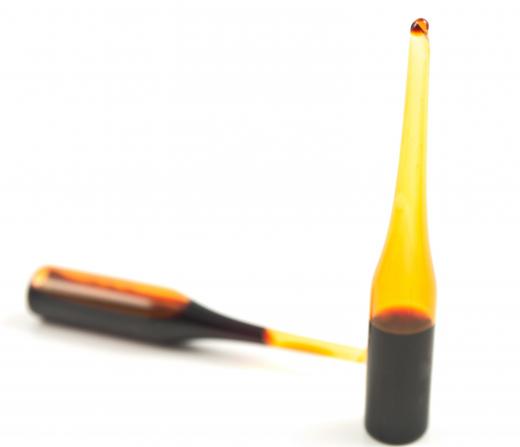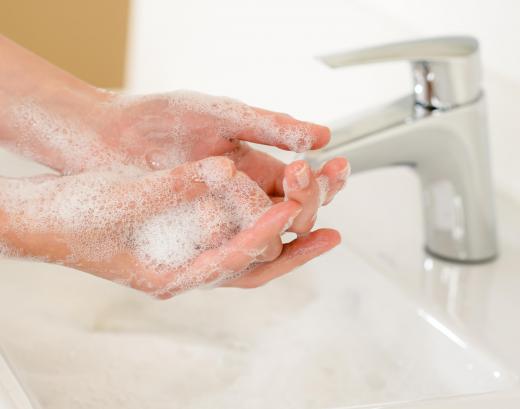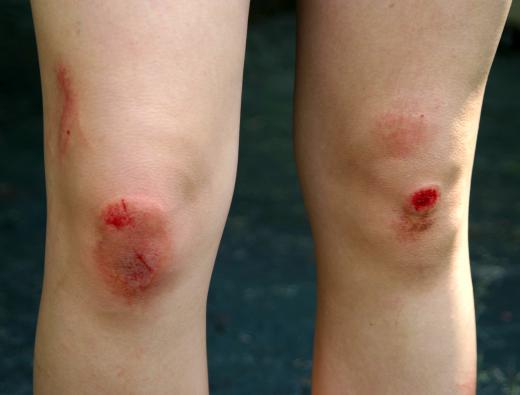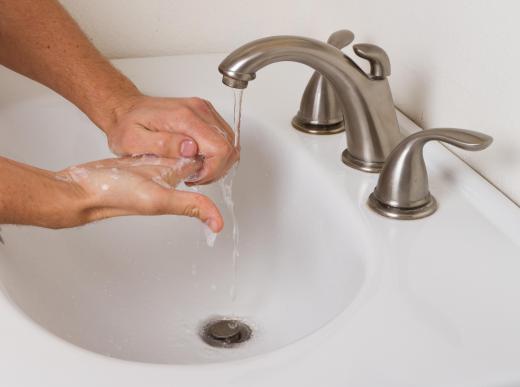Why is Alcohol a Good Antiseptic?
 Michael Anissimov
Michael Anissimov
There are a number of different types of alcohol, but the ones generally used as antiseptics are ethanol — also known as ethyl alcohol — and isopropyl alcohol, or isopropanol. Both chemicals are effective against a wide range of bacteria, viruses, protozoa, and fungi, and have relatively low toxicity to humans. They are most commonly used as skin antiseptics, often in the form of wipes or gels, and for disinfecting surfaces, but they are not generally used for sterilizing instruments. Their main effect on microorganisms seems to be to coagulate essential proteins, rendering them ineffective, and causing cell death or inhibiting reproduction. They may also have a dehydrating effect and may interfere with the functioning of cell membranes.
Mode of Action

Proteins are common to all living things and perform many essential functions within cells. For example, a class of proteins known as enzymes allow cells to carry out the chemical reactions that keep them alive. Protein molecules have complex shapes that are crucial to the way they behave and, if a protein loses its shape, it will probably not be able to perform its function. The loss of shape in a protein is known as denaturation, and it happens when the bonds that maintain its form are broken. Proteins that have been denatured tend to coagulate, meaning that the molecules clump together into a formless, solid mass.

Alcohols denature proteins by breaking the hydrogen bonds that link oppositely charged hydrogen and oxygen atoms on different parts of the chain-like molecules. They do this because they themselves form hydrogen bonds at these locations, causing the protein molecule to lose its shape. Their effectiveness depends on how concentrated they are. Ethanol, for example, works best against microorganisms at about 70% concentration, as it is easily absorbed by cells. At much higher concentrations, it coagulates proteins on the cell surface, preventing further penetration; microbes are often able to survive this, although they may be temporarily inactivated.

Although ethanol and isopropanol are both useful antiseptics with similar modes of action, there appear to be some differences in their effectiveness against different types of microbe. Ethanol seems to be slightly more effective than isopropyl alcohol against viruses, while the reverse appears to be true for bacteria. In addition to denaturating proteins, these alcohols can have a dehydrating effect, and can also dissolve lipids — fats and oils — to some extent, which can damage cell membranes. Ethanol has a greater dehydrating effect, while isopropanol has a greater affinity for lipids.
Use

Alcohols are often used in hand washing products, both in hospitals and for the home. In this context, they are often marketed as bottles of alcohol-based gel to be rubbed on the skin. Hospital staff are encouraged to frequently wash their hands with antiseptic preparations to minimize the risk of dangerous infections in vulnerable patients. Another common form is wipes, where the chemical is impregnated into pieces of cotton cloth that can be used to wipe surfaces or wash hands. Ethanol and isopropanol are often used to disinfect the skin just prior to surgery.

Although these substances may cause drying and minor irritation of the skin, they do not damage living tissue through normal use, as it is protected by an outer layer of dead skin cells. They should not, however, be used internally or on sensitive areas of the body. Alcohols are not normally used for sterilizing wounds because they can cause damage to the internal tissues, although they have occasionally employed for this purpose in emergency situations. Other biocides may sometimes be combined with alcohol to increase the effectiveness of both substances. One of the oldest and best-known examples is tincture of iodine, which is a solution of iodine in ethanol.
Advantages and Disadvantages
As antiseptics, alcohols have the advantages of being fast acting and very effective against the majority of harmful microorganisms. They also evaporate quickly, so that they do not leave the skin wet for long, making hand drying unnecessary. This can also be a disadvantage, as it means that the effect is short-lived, so that microbes can survive on surfaces treated with this form of antiseptic just a short time after application. For this reason, other antiseptic substances that remain on the skin or surface after the alcohol has evaporated may be added.
Some bacteria can go into a dormant phase known as a spore when conditions are unfavorable for growth and multiplication, becoming active again when conditions improve. Spores are often very resilient, and alcohols generally do not kill them, although they can temporarily prevent them from becoming active. Again, this problem can often be overcome by adding other substances that are more effective in killing spores.
Ethanol and isopropanol can have a dehydrating and irritating effect on the skin. For this reason, commercial alcohol-based hand washes usually have an emollient, or moisturizer, added to help replace moisture and oils lost from the skin.
AS FEATURED ON:
AS FEATURED ON:















Discussion Comments
Can wood grain alcohol cause your taste of beer, brandy, bourbon, vodka, mouth wash containing alcohol and other alcoholic beverages only to all have the same taste and aroma? It does not change the taste of food, water and other beverages that do not contain wood grain alcohol.
My wife and I travel a lot in countries where the water is not acceptable to drink, especially by Americans. i.e. India, China, etc.
My question is does whiskey/scotch over ice made in these countries kill most of the bacteria in the water used to produce the ice?
Let's assume 2 oz. of 80 (40 percent abv) proof ethyl alcohol in a glass with 6-1 inch cubes of ice. By my calculation, the ice will melt into 6 cu in of water or 3.32 oz of water plus 2 oz of scotch equals a solution of approx. 5.3 oz with 0.8 oz of alcohol or 15 percent alcohol concentration. Will this kill the bacteria and render the solution safe to drink? Thanks.
Does the "70 percent works better than 90 percent" rule apply to isopropyl alcohol also? I've always bought 90 percent isopropyl to use as an antiseptic thinking it worked better than 70 percent, but if the coagulation problem exists with both ethyl and isopropyl alcohol than why is 90 percent isopropyl alcohol even sold at all?
You can find an EPA-registered disinfectant with 70 percent alcohol, and an FDA-approved antiseptic with the same 70 percent alcohol online.
You have to use the EPA-registered disinfectant on surfaces, and the FDA-approved antiseptic on skin, and not vice-versa, because the FDA regulates products that kill germs on people, and the EPA regulates products that kills germs on everything else.
Alcohol is one of the few products that is useful as both an antiseptic and as a surface disinfectant, so rather than confuse people with combination approvals which would require lots more government bureaucracy, you figure out what you need the product to do, and then you buy it as either the skin antiseptic, or as the surface disinfectant.
If you need alcohol for "cleansing," you can purchase jugs of various strengths of alcohol with neither FDA nor EPA approval. So, even though cleansing alcohol may have the same 70 percent alcohol, you are obliged to use the product according to the package label directions, and use it only for cleaning things, and not for disinfection or as an antiseptic.
You can also purchase bottles of 70 percent alcohol as "rubbing alcohol," in which case you would use the product for that purpose, and again, not for disinfection or antiseptic. I suppose you could use it for cleaning.
But the rule is, follow the label directions.
EPA-approved products for surface disinfection.
FDA-regulated products for antiseptics.
Home Depot for cleaning alcohol.
The supermarket for rubbing alcohol.
As a by the way, ethyl (grain) alcohol is safer for use on the skin, because it works at a lower concentration (65-80 percent) than isopropyl (70 to 95 percent).
You'll notice on the label of some isopropyl alcohol products that they will tell you not to use it for an extended period of time. The reason for this is because whatever amount of isopropyl alcohol soaks into your skin gets into your bloodstream, and then it's broken down in your liver into a variety of compounds including acetone, which is extremely toxic to your liver. Ethyl alcohol won't do this.
I used a small amount of 70 percent Isopropyl alcohol on my face and back where acne grows. The cotton ball at the end made me feel like it was effective because it had a brown dirty looking color. I am going to see if i grow any new pimples tomorrow. This may help me confirm whether or not a small amount of alcohol on the face is effective.
Ethanol is effective at eliminating some viruses, but it has no effect on Rhinovirus - the most common cause of the common cold.
Which is the better disinfectant: Isop. alcohol or hydrogen peroxide? Did I understand your above comment correctly that hydrogen peroxide kills both bacteria and viruses on surfaces?
Is ethyl alcohol or isopropyl alcohol effective against viruses? I have been under the impression that alcohol works against bacteria, not viruses, which are susceptible to hydrochloride or hydrogen peroxide.
If that is true, I wonder what is the rationale for asking people to use alcohol rub as a precaution against contracting influenza.
In the same note, I am not aware of any epidemiological evidence that influenza is transmitted by touch, e.g., rubbing of eyes by contaminated hands. As a respiratory infection, influenza is transmitted by respiratory droplets or aerosols. So what is the justification for advising the public to wash hands?
TW Wong
My barbering textbook says 70% ethyl (grain) alcohol, or 90% isopropyl alcohol make useful sanitizers.
We're supposed to use products according to packaging directions, but I'll be danged if I can find a bottle of alcohol or rubbing alcohol that gives clear directions on how to use it for a sanitizer.
Labels seem rather vague on the whole question.
what type of bacteria does can alcohol possibly inhibit?
RE:
Posted by: Anonymous
1-what is the ideal % of alcohol as antiseptic?
70% is the ideal solution, more than that and it decreases its efficacy.
1-what is the ideal % of alcohol as antiseptic?
2-what the difference between propanol, iso propanol & ethanol? which is more effective?
3- does the form of alcohol antiseptic (solution, gel or foam) affect the efficacy of alcohol?
Post your comments